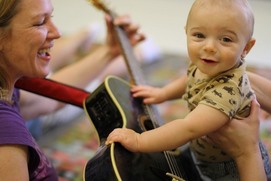|
-Meredith Manley A lot of people ask me what age should their child start learning about music, and their guess is usually around age 4 or 5. While this might be a great age to begin studying an instrument in private lessons, there is a lot of learning that needs to happen before then. The real “window of opportunity” for music learning is from birth to age 5. How do you get a child ready for private lessons when they are so young? The answer is through music immersion, or exposure to a rich musical environment. As a certified Music Together teacher, I firmly believe that attending music class should start before their first birthday. As a parent, you simply have to provide your child with this environment. Although babies are in “receptive mode”, they observe and absorb sensory experiences and respond to music in different ways. Outward responses become more advanced as the child grows older. I love to share this story of a family who attended my Music Together classes for years in Chicago. Abigail was only 6 months old when she started coming to my class, and she eventually completed the 3 year curriculum. Once you finish the curriculum, you start again with the first collection of songs. When we returned to the songs from when she was just an infant, she sang every word of every song in the collection IN TUNE. Her parents were amazed; I think they finally believed me after all of the times I told them that she is learning even though she cannot outwardly “participate”. A relatable comparison is language development; you have to expose your child to elements of speech (talking to your child, reading books, singing, etc.) in order for them to develop it.
So what exactly are the skills that are gained from music class that will help prepare for private lessons? The two main things are a sense of steady beat and tonality. Within the first lesson, I can see if a student has a good “internal metronome”- can they play a piece with a steady beat, or do they slow down and speed up at different parts? Developing the internal metronome is a big focus in early childhood music classes, and it is primarily achieved through movement and instrument play. Tonality in layman’s terms is the structure, order, and spacing of pitches. A child who has been training his/her ear in music classes for a few years will be able to sing “in tune” and display a beginning understanding of pitch spacing. Besides preparing your child for private lessons, music classes also do wondrous things for general development. According to research studies, children who participated in interactive music classes before age 7 have more sophisticated language skills and extensive wiring in the corpus callosum (the nerve bundle that connects the two hemispheres in the brain). Whether or not you have a strong desire for your child to study an instrument, music classes are beneficial for brain development upon which other learning depends on. To learn more about music immersion and the importance of early childhood music, click here To learn more about the stages of music development in children, click here
0 Comments
Your comment will be posted after it is approved.
Leave a Reply. |
Archives
July 2024
Categories
All
|
|
|
MUSIC SO SIMPLE
|

 RSS Feed
RSS Feed